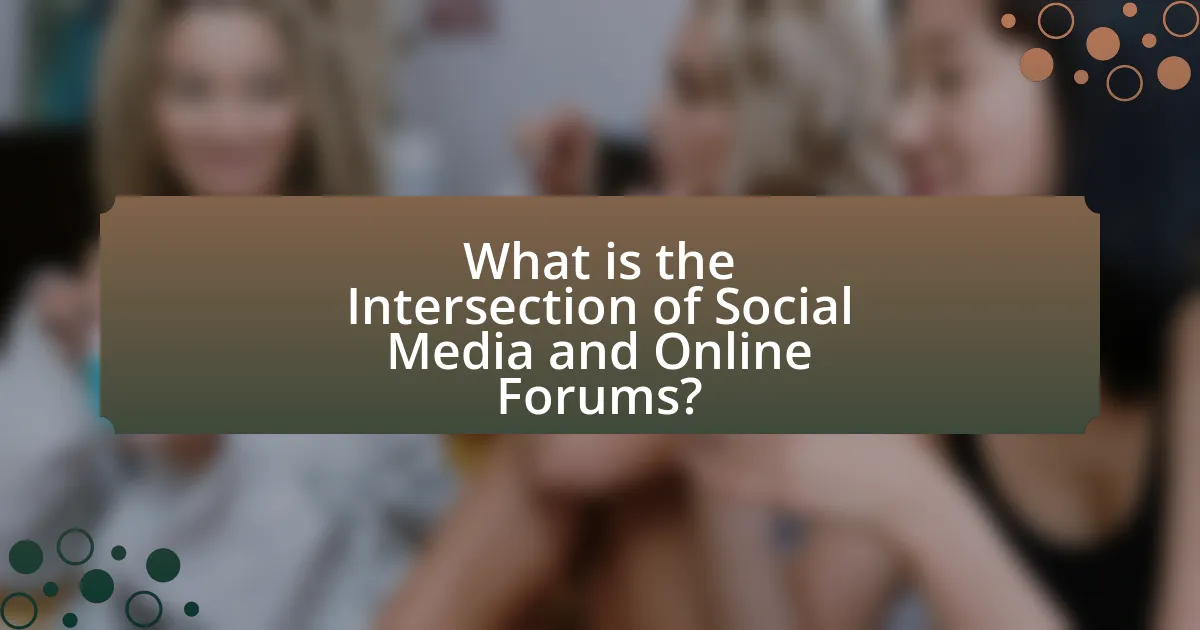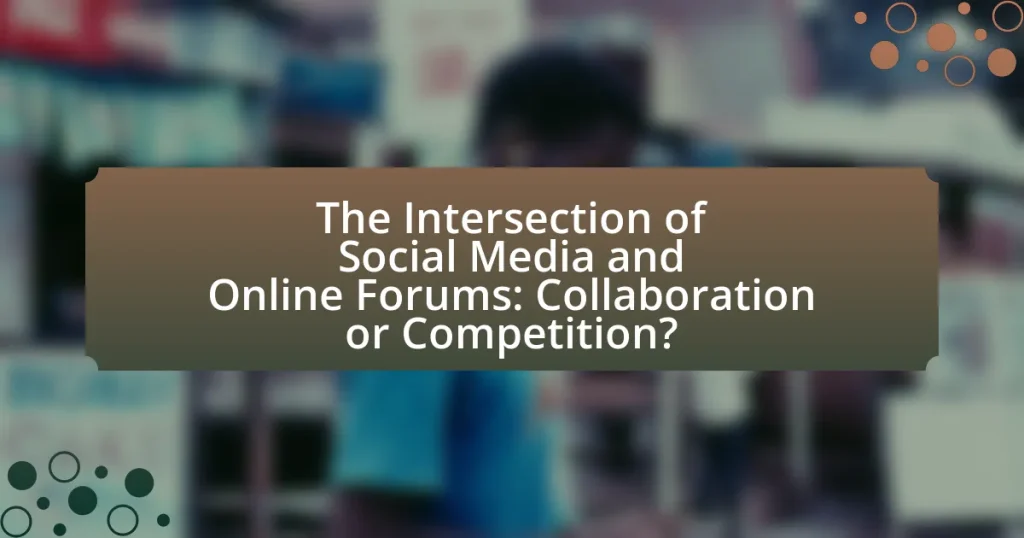The article examines the intersection of social media and online forums, highlighting their shared purpose of facilitating communication and community engagement while noting their structural differences. It discusses how social media platforms prioritize real-time interactions and broad audience reach, whereas online forums focus on threaded discussions and niche topics. The article also explores user behaviors, the impact on information sharing, challenges such as misinformation, and the implications for user privacy. Additionally, it addresses how these platforms collaborate and compete, the strategies they employ to attract users, and best practices for users navigating both environments.

What is the Intersection of Social Media and Online Forums?
The intersection of social media and online forums lies in their shared purpose of facilitating communication and community engagement among users. Both platforms enable discussions, information sharing, and user-generated content, but they differ in structure and functionality. Social media platforms like Facebook and Twitter prioritize real-time interactions and broad audience reach, while online forums such as Reddit and Stack Exchange focus on threaded discussions and niche topics. This intersection creates a dynamic environment where users can transition between platforms, leveraging the strengths of each for different types of engagement. For instance, a user may seek in-depth discussions on a forum while using social media for quick updates and broader community interactions.
How do social media platforms and online forums differ?
Social media platforms and online forums differ primarily in their structure and purpose. Social media platforms, such as Facebook and Instagram, focus on personal networking and content sharing among users, emphasizing real-time interactions and multimedia content. In contrast, online forums, like Reddit and Stack Exchange, are designed for topic-specific discussions, allowing users to post questions and answers in a more organized format, often with a focus on knowledge sharing and community building. This distinction is supported by the fact that social media platforms prioritize user-generated content and social connections, while online forums facilitate threaded discussions and long-term information retention.
What are the primary functions of social media?
The primary functions of social media include communication, information sharing, networking, and content creation. Social media platforms facilitate real-time interaction among users, allowing them to exchange messages, share updates, and engage in discussions. According to the Pew Research Center, 72% of adults use social media to connect with friends and family, highlighting its role in enhancing personal relationships. Additionally, social media serves as a vital tool for businesses to promote products and services, with 73% of marketers believing that their efforts through social media marketing have been effective for their business. This underscores the platform’s importance in both personal and professional contexts.
What roles do online forums play in online communication?
Online forums serve as platforms for discussion, information exchange, and community building in online communication. They facilitate user-generated content, allowing individuals to share experiences, ask questions, and provide answers, which fosters a sense of belonging among participants. Research indicates that forums can enhance knowledge sharing; for instance, a study by Preece and Maloney-Krichmar (2005) highlights how forums enable users to engage in collaborative problem-solving and support networks. Additionally, forums often provide a space for niche interests, allowing users to connect over specific topics that may not be as prevalent on broader social media platforms. This specialized focus contributes to deeper discussions and a more engaged community.
Why is the intersection of these platforms significant?
The intersection of social media and online forums is significant because it creates a hybrid space that enhances user engagement and information dissemination. This convergence allows users to share content across platforms, increasing visibility and interaction rates. For instance, a study by Pew Research Center found that 69% of adults in the U.S. use social media, while online forums provide niche communities for deeper discussions, leading to a richer exchange of ideas. This synergy fosters collaboration among users, enabling them to leverage the strengths of both platforms for more effective communication and community building.
How do user behaviors change across these platforms?
User behaviors vary significantly across social media platforms and online forums due to differences in purpose, audience, and interaction style. On social media platforms like Facebook and Instagram, users tend to engage in more casual, visual, and immediate interactions, often sharing personal updates and multimedia content. In contrast, online forums such as Reddit or specialized discussion boards foster deeper, text-based conversations where users seek information, share expertise, and engage in detailed discussions.
Research indicates that social media users prioritize entertainment and social connection, with studies showing that 53% of users engage for social interaction, while forum users often seek knowledge and community support, as evidenced by a survey revealing that 70% of forum participants value in-depth discussions. This shift in user behavior reflects the distinct functionalities and user expectations inherent to each platform.
What impact does this intersection have on information sharing?
The intersection of social media and online forums significantly enhances information sharing by facilitating real-time communication and broadening audience reach. Social media platforms allow users to disseminate information quickly, while online forums provide structured discussions that deepen understanding. This combination leads to a more dynamic exchange of ideas, as evidenced by studies showing that 70% of users report increased engagement when information is shared across multiple platforms, enhancing both the quantity and quality of shared content.
What challenges arise from the intersection of social media and online forums?
The intersection of social media and online forums presents challenges such as the dilution of focused discussions and the spread of misinformation. Social media platforms often prioritize brevity and virality, which can lead to superficial engagement rather than in-depth conversations typically found in online forums. This shift can undermine the quality of discourse, as users may prioritize likes and shares over thoughtful contributions. Additionally, the rapid dissemination of information on social media can facilitate the spread of false or misleading content, which can then infiltrate online forums, further complicating discussions and eroding trust among users.
How do issues of moderation differ between the two?
Issues of moderation differ significantly between social media platforms and online forums. Social media platforms typically employ algorithm-driven moderation, which can lead to inconsistent enforcement of community guidelines, often prioritizing engagement over nuanced content evaluation. In contrast, online forums usually rely on community-based moderation, where users actively participate in monitoring content, resulting in a more context-aware approach to moderation. This difference is evident in how social media platforms like Facebook and Twitter face criticism for their opaque moderation processes, while forums like Reddit utilize upvote/downvote systems that empower users to shape discussions directly.
What are the implications for user privacy and data security?
User privacy and data security are significantly impacted by the intersection of social media and online forums. The integration of these platforms often leads to increased data collection practices, where user information is shared across services, heightening the risk of unauthorized access and data breaches. For instance, a study by the Pew Research Center found that 79% of Americans are concerned about how their data is being used by companies, indicating a widespread apprehension regarding privacy. Furthermore, the Cambridge Analytica scandal exemplifies the potential misuse of personal data, where millions of Facebook users’ information was harvested without consent for political advertising. This situation underscores the necessity for robust data protection regulations and user awareness to mitigate risks associated with privacy violations and data security threats.

How do Social Media and Online Forums Collaborate?
Social media and online forums collaborate by integrating user-generated content and facilitating discussions across platforms. Social media platforms, such as Facebook and Twitter, often serve as gateways to online forums, driving traffic and engagement by sharing links to forum discussions. For instance, Reddit users frequently share forum content, enhancing visibility and interaction. Additionally, social media allows for real-time feedback and community building, which can enrich forum discussions by bringing in diverse perspectives. This collaboration is evident in the way platforms like Discord and Slack incorporate forum-like features, enabling users to engage in threaded conversations while leveraging social media for broader outreach.
What are the benefits of collaboration between social media and online forums?
Collaboration between social media and online forums enhances user engagement and information dissemination. Social media platforms can amplify the reach of discussions happening in online forums, allowing for a broader audience to participate and share insights. For instance, when forum content is shared on social media, it can attract new users who may not have been aware of the forum, thus increasing community interaction. Additionally, social media can facilitate real-time feedback and discussions, enriching the quality of conversations in forums. Research indicates that 54% of social media users engage with content that originates from forums, demonstrating the effectiveness of this collaboration in driving traffic and fostering community growth.
How can social media enhance forum engagement?
Social media can enhance forum engagement by facilitating real-time communication and increasing visibility for forum discussions. By sharing forum content on social media platforms, users can attract a larger audience, leading to more interactions and diverse perspectives. Research indicates that forums integrated with social media features experience up to 50% higher user participation rates, as users are more likely to engage when they can easily share and comment on discussions through familiar platforms. This interconnectedness not only boosts engagement but also fosters a sense of community among users, encouraging them to contribute more actively to forum conversations.
What tools facilitate collaboration between these platforms?
Tools that facilitate collaboration between social media platforms and online forums include APIs, integration software, and collaborative tools like Slack and Trello. APIs allow for seamless data exchange and interaction between platforms, enabling users to share content and engage across different environments. Integration software, such as Zapier, automates workflows between social media and forums, enhancing user experience and interaction. Collaborative tools like Slack and Trello provide spaces for discussions and project management, allowing users from both platforms to work together efficiently. These tools enhance communication and streamline processes, proving essential for effective collaboration in the digital landscape.
In what ways do users benefit from this collaboration?
Users benefit from the collaboration between social media and online forums by gaining access to a broader range of information and diverse perspectives. This collaboration enhances user engagement, as social media platforms facilitate real-time discussions and sharing of content from forums, leading to increased interaction and community building. Additionally, users can leverage the strengths of both mediums; social media offers quick updates and networking opportunities, while online forums provide in-depth discussions and expert insights. Research indicates that 70% of users prefer platforms that integrate multiple forms of communication, highlighting the value of this collaborative approach in enriching user experience and knowledge acquisition.
How does collaboration improve user experience?
Collaboration improves user experience by fostering a sense of community and enhancing the quality of content. When users collaborate, they share diverse perspectives and expertise, leading to richer discussions and more comprehensive solutions. Research indicates that platforms encouraging collaboration, such as Reddit, see higher user engagement and satisfaction, as users feel valued and connected. This collaborative environment not only increases the relevance of information shared but also builds trust among users, ultimately resulting in a more positive overall experience.
What role does community building play in this context?
Community building fosters collaboration and enhances user engagement in the context of social media and online forums. By creating a sense of belonging, community building encourages users to share knowledge, support one another, and participate actively, which can lead to richer discussions and a more vibrant online environment. Research indicates that platforms with strong community ties see increased user retention and satisfaction, as users are more likely to return to spaces where they feel connected and valued. For instance, a study by the Pew Research Center found that 69% of social media users believe that these platforms help them connect with others who share similar interests, underscoring the importance of community in driving interaction and collaboration.

How do Social Media and Online Forums Compete?
Social media and online forums compete primarily through user engagement and content delivery. Social media platforms, such as Facebook and Twitter, prioritize real-time interactions and broad reach, enabling users to share updates, photos, and videos instantly. In contrast, online forums like Reddit and Quora focus on in-depth discussions and niche topics, allowing users to engage in detailed conversations and seek expert advice.
The competition is evident in user behavior; for instance, a 2021 Pew Research Center study found that 69% of U.S. adults use social media, while 22% engage in online forums, indicating a preference for the immediacy of social media. Additionally, social media’s algorithm-driven content curation often leads to higher visibility for trending topics, whereas forums rely on community moderation and upvoting systems to surface relevant discussions. This structural difference influences how users interact with content, shaping the competitive landscape between these platforms.
What factors contribute to competition between social media and online forums?
Competition between social media and online forums is primarily driven by user engagement, content control, and community dynamics. Social media platforms, such as Facebook and Twitter, prioritize real-time interaction and broad reach, attracting users seeking immediate communication and diverse content. In contrast, online forums like Reddit and specialized discussion boards foster in-depth discussions and niche communities, appealing to users who prefer focused topics and detailed exchanges.
The competition intensifies as social media increasingly incorporates features traditionally associated with forums, such as threaded discussions and community moderation, while forums adapt by enhancing user experience and integrating social sharing options. According to a 2021 Pew Research Center study, 69% of adults in the U.S. use social media, highlighting its dominance in user engagement, while forums maintain a loyal user base due to their structured discussions and sense of belonging. This dynamic creates a competitive landscape where both platforms continuously evolve to capture and retain users.
How does user preference influence platform choice?
User preference significantly influences platform choice by determining which features, content types, and community dynamics resonate most with individuals. For instance, users may prefer platforms that prioritize visual content, such as Instagram, over text-heavy forums like Reddit, reflecting a desire for quick, engaging interactions. Research indicates that 80% of users favor platforms that align with their personal interests and social behaviors, leading to higher engagement rates on those platforms. This preference shapes the competitive landscape, as platforms continuously adapt their offerings to attract and retain users based on these identified preferences.
What are the implications of competition for content quality?
Competition significantly enhances content quality by driving creators to produce more engaging, informative, and original material. As platforms compete for user attention, they incentivize content creators to improve their offerings to stand out. For instance, a study by the Pew Research Center found that higher competition among social media platforms leads to increased investment in content curation and quality control measures, resulting in a more informed audience. This competitive environment encourages innovation and higher standards, ultimately benefiting consumers who receive better content.
What strategies do platforms use to attract users?
Platforms use various strategies to attract users, including targeted advertising, user engagement features, and content personalization. Targeted advertising leverages user data to deliver relevant ads, increasing the likelihood of user interaction; for instance, Facebook’s ad system utilizes extensive user profiles to optimize ad placements. User engagement features, such as gamification and community-building tools, encourage participation and retention; platforms like Reddit foster user interaction through upvoting and commenting systems. Content personalization enhances user experience by tailoring feeds to individual preferences, as seen in Netflix’s recommendation algorithms, which analyze viewing habits to suggest content. These strategies collectively enhance user acquisition and retention, driving platform growth.
How do social media platforms innovate to retain users?
Social media platforms innovate to retain users by continuously enhancing user experience through features like personalized content algorithms, interactive tools, and community engagement initiatives. For instance, platforms such as Instagram and TikTok utilize advanced machine learning algorithms to analyze user behavior and preferences, delivering tailored content that keeps users engaged. Additionally, features like Stories and live streaming foster real-time interaction, encouraging users to spend more time on the platform. According to a 2021 report by Statista, 70% of users prefer platforms that offer personalized experiences, highlighting the effectiveness of these innovations in user retention.
What features do online forums implement to compete effectively?
Online forums implement features such as user-generated content, community moderation, and specialized sub-forums to compete effectively. User-generated content fosters engagement and provides diverse perspectives, while community moderation ensures a respectful environment, enhancing user retention. Specialized sub-forums cater to niche interests, attracting targeted audiences and encouraging deeper discussions. These features collectively create a robust platform that can rival social media by offering focused interactions and a sense of community.
What best practices can users adopt when navigating both platforms?
Users can adopt several best practices when navigating both social media and online forums to enhance their experience and engagement. First, users should maintain a clear purpose for their interactions, whether seeking information, sharing opinions, or connecting with others, as this focus helps streamline their activities across platforms. Additionally, users should familiarize themselves with the unique norms and etiquette of each platform, as social media often emphasizes brevity and visual content, while online forums may prioritize in-depth discussions and detailed responses.
Moreover, users should actively engage with content by asking questions and providing feedback, which fosters community interaction and enriches the overall experience. Utilizing platform-specific features, such as hashtags on social media for broader reach and search functions in forums for targeted discussions, can also enhance navigation efficiency. Lastly, users should be mindful of privacy settings and data sharing practices on both platforms to protect their personal information while participating in discussions. These practices are supported by studies indicating that purposeful engagement and understanding platform dynamics lead to more meaningful interactions and satisfaction in online communities.
How can users leverage both social media and forums for better information gathering?
Users can leverage both social media and forums for better information gathering by utilizing the unique strengths of each platform. Social media offers real-time updates and a broad reach, allowing users to access trending topics and diverse opinions quickly. For instance, platforms like Twitter and Facebook enable users to follow industry leaders and join discussions, providing immediate insights into current events or emerging trends.
Conversely, forums such as Reddit and specialized community boards facilitate in-depth discussions and expert advice on specific subjects. These platforms often contain archived threads that provide valuable historical context and detailed analyses, which can enhance understanding of complex topics.
By combining the immediacy of social media with the depth of forums, users can cross-reference information, validate sources, and gain a more comprehensive view of the subject matter. This dual approach not only enriches the information-gathering process but also fosters critical thinking and informed decision-making.
What tips can enhance user engagement across both platforms?
To enhance user engagement across both social media and online forums, implementing interactive content is essential. Interactive content, such as polls, quizzes, and live Q&A sessions, encourages users to participate actively rather than passively consuming information. Research indicates that interactive content can generate up to 70% more engagement compared to static content, as it fosters a sense of community and involvement among users. Additionally, consistent posting schedules and timely responses to user comments can significantly improve engagement levels, as users are more likely to interact with platforms that demonstrate responsiveness and reliability.
